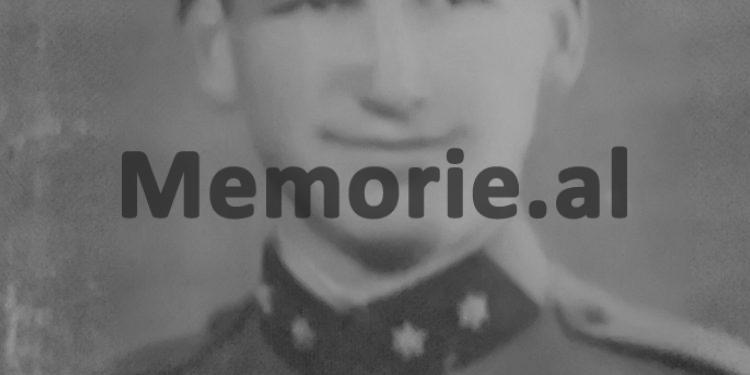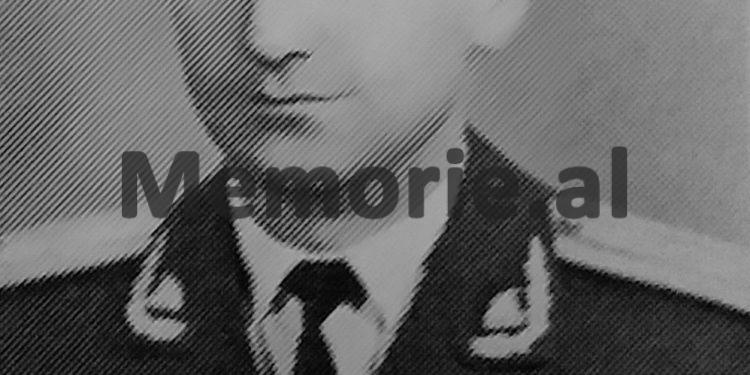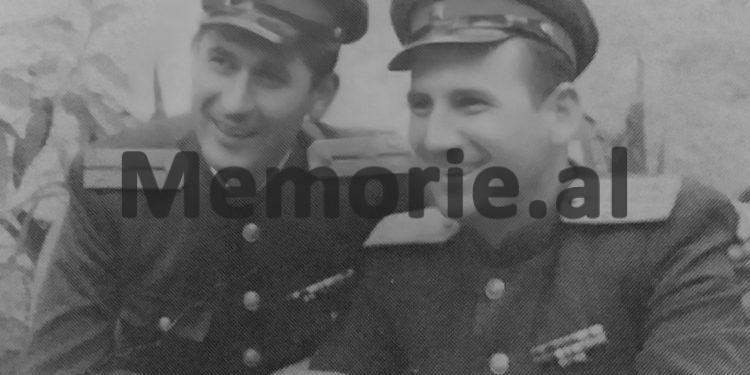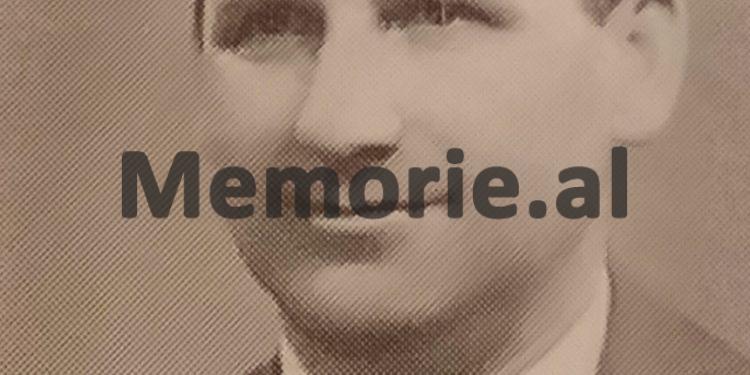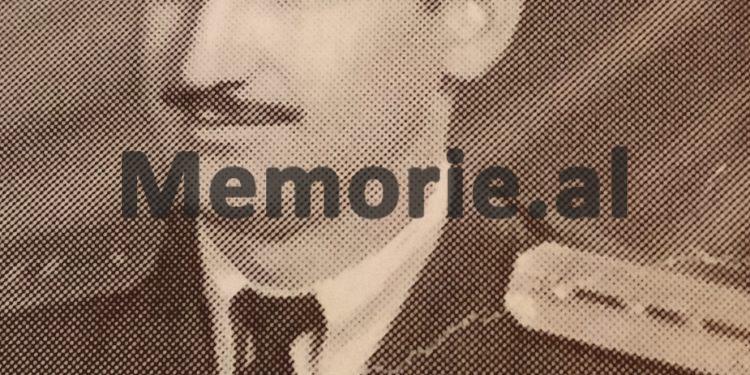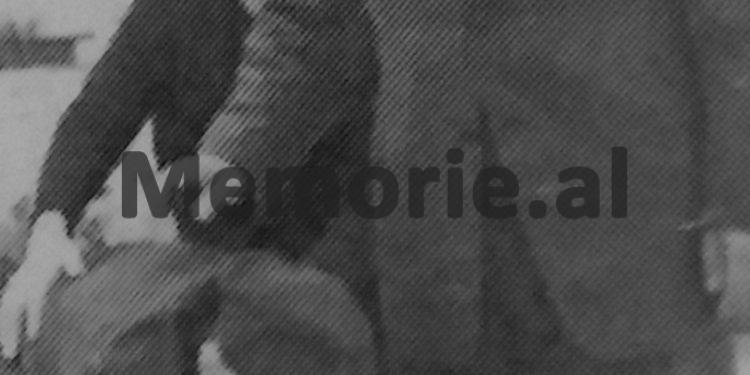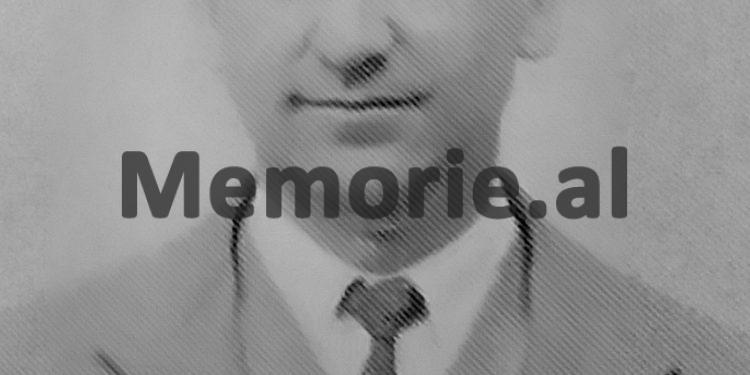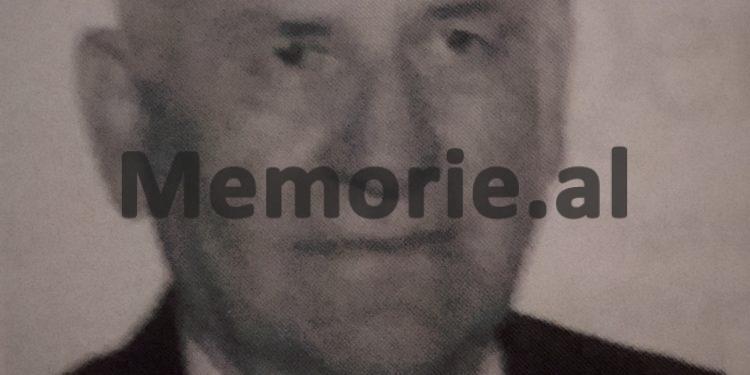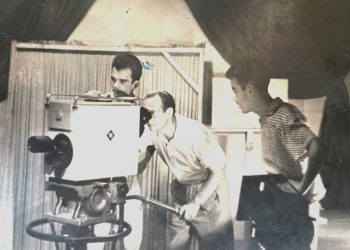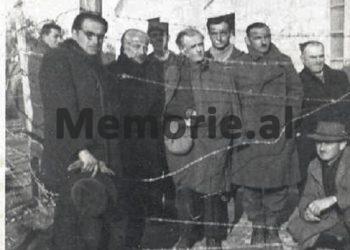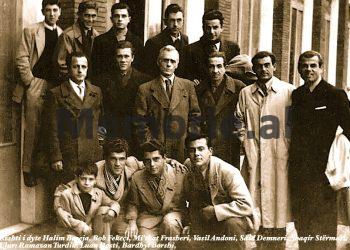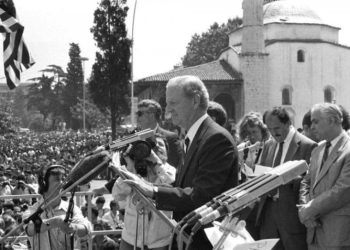Dashnor Kaloçi
Memorie.al publishes the untold story of former State Security Major Koci Lubonja, who after partisans at the age of 17 with all his siblings, fighting as a company commander in the 4th Attack Brigade for Liberation. of Tirana, after 1944 served as Commander of Tirana Prison and later as Chief of Military Aviation Security, and lectured at the State Security High School in Sauk, Tirana.
How Kochi was demobilized by the State Security Service following his stand at the Tirana Party Conference in 1956, where he asked the question: What laws had supported the arrest of Tuk Jakova and Bedri Spahiu? It caused him to be handcuffed, but he could only escape because he was the brother of Xhaferr Cenko Lubonja, “Martyr of the Homeland” and the founder of the State Security Weapon.
How could Kochi work as a Lawyer at ALB-IMPORT Enterprises until 1975, when he was sent to Librazhd, where he was expelled from the party and his arrest was being prepared as an “agent and enemy of the people”, because of the need for work accompanied in some cities a Bulgarian with his Dutch wife.
As dissatisfaction with the communist regime and the figure of Enver Hoxha accumulated in Ljubljana until 1986, he wrote a lengthy 56-page anonymous letter to Ramiz Alia asking him to condemn the figure of Enver Hoxha, which led to his arrest. and his sentence, closing as “irresponsible in the middle” at the Elbasan Psychiatric Hospital (following a “pact” between Investigators and doctors opposed by Zylyftar Ramizi), from which he was released only in November 1989.
From the analysis of Enver Hoxha’s work and the verification of his past, I have come to the inexcusable conclusion that he was a French espionage agent (the “Deuxieme Bureau”). The truth is that Enver was activated in France, not in favor of communism, but in the service of French intelligence, according to the instructions and duties assigned to him. Enver’s entire life is dubious and with a host of unexplained questions. Everyone has known that the secretary’s post at the Brussels Consulate was a post of espionage bodies and its paid task to destroy the leftist movement. He has never participated in leftist communist groups in France, nor has he ever written for the Sazani and Ymanite newspapers. This was also claimed by the Communist and militant Qamil Çela, who refused to write those lies in “Voice of the People” when asked. Exactly refusing to release those unfounded statements about Enver Hoxha, he was interned and continues to be cruelly persecuted. ”
These and other allegations about the figure of Enver Hoxha were made to Ramiz Alia on October 11, 1986, by a 56-page long letter, from Kochi Lubonja, a former partisan with leadership functions and after the war, commander of the Prison Prison. Tirana, Head of Albanian Aviation Security with a major and lecturer at the State Security School and a lawyer at ALB-IMPORT.
But why did Lubonja take this risky adventure that would cost him dearly, what was further stated in that letter, and what were the motives that led him to seek Ramiz Alia’s sentence of Enver Hoxha?
Concerning these and the vicissitudes that came from her, as well as other events of his life from the time he commanded a partisan company in the liberation of Tirana until the late 1980s when he ended State Security cells accused of being an “enemy of the people” knows us an interview we received from Koci Lubonja years ago, which we are publishing exclusively for Memorie.al.
Mr. Lubonja, initially something about the origin of your family?
I was born in April 1925 in the village of Ljubonja in Korça, where my family is from. My father Avdurraman Lubonja was one of Petro Nini Luarasi’s closest people, and together with him in 1905, set up in Ohio, USA, the first patriotic Albanian society called the “Motherland.” Later, as a friend and associate of Fan Noli, my father participated in the formation of the Vatra Society in Boston, USA, is in charge of this association until 1920 when he returned home. He was killed by the braves of Maliq Bey Frashri in 1930, leaving us orphans with five young children.
When did you engage as a family in the National Liberation War?
My family was one of the first bases of the War, and it formed the first partisan group in the area, where my brother, Xhafer Cenko Lubonja, was commissioned as a Communist of the Korça Group. After Brother Xhaferri, we participated in the War as a partisan and I (at the age of 17), along with our two sisters, Bayam and Resmijen. I was a company commander in the Fourth Brigade and participated in all the battles of this Brigade until the liberation of Tirana, where I commanded two partisan platoons at Skanderbeg Square. Being the main base of the War, our house was twice burned by the Italians, and after that, we settled in Korça. There, too, our home was a base for war, and my sister, Almond, was wounded in a demonstration by the fascists along with her mother. Likewise, his brother, Xhaferi, was killed in the war when he was in charge of the Information Division of the First Division of North Albania and was proclaimed a “Martyr of the Fatherland”.
Where did you serve after the War?
The end of the war found me with the rank of lieutenant, and in the final days of the liberation of Tirana, by the government, I was assigned the task of commanding a partisan group to take over the National Bank. I did that task with great precision until he came and took over a government commission headed by Sejfulla Maleshova.
Is it true that the Germans kidnapped gold and what was the amount?
From the inventory made at that time by Bank specialists who were all Italians residing there, it turned out that the Germans had received a total of 14 quintals. gold and they left there a little less than what they received. For all the gold withdrawals from the Bank’s treasury, the Germans had left regular paperwork.
After this assignment, where did you go?
As everyone was satisfied with this assignment, I was assigned to the Tirana Prison Commander, (today Ward 313), a position I held until June of that year. Subsequently, I was assigned an important task under the operational dependence of the State Security and precisely from Vaski Koleci, Nesti Kerenxhi, Teme Sejko, and Nesti Zoto. On the military side, I would depend on the First Defense Brigade, commanded by Zija Kambo and Mihallaq Ziishtiisht.
Why did you leave the prison commander?
After the Special Trial ended in 1945, I allowed a meeting in my office and in the presence of the former Prime Minister, Koco Kotes, with his wife, but this was arranged and the Interior Ministry and Defense Brigade were informed that day… They replaced me with Janaq Karapataqi and made me available.
During the time you were the director of Prison 313, have there been any cases of non-trial elimination of regime opponents, or reactionaries as you called them?
I say responsibly, that: during that time, I do not know that there was no murder without trials, this happened in the days of the liberation of Tirana when there were such cases. At that time, State Security, when it wanted to kill anyone, found it difficult to put them on trial, so to speak. There have been a number of non-judicial killings, but they were carried out at the investigator rather than in the prisons.
Where did you work then?
In 1949, when Enver Hoxha convicted Kochi Xoxen, I was sent to attend Sauk State Security School, and after graduating in 1950, I was appointed Head of Aviation Security. I then pursued Law at night and began work as a lecturer at the School of Security, wherein 1959, I was demobilized as an unwanted person, after which I had not forgotten what I had done when I was a delegate to the Tirana Conference in 1956.
What had you done at the Tirana Conference?
I was a delegate to the Security School at that Conference. I remember well when Enver came to the frenzied hall, addressing the delegates, and in particular Colonel Iljaz Ahmeti, saying: “I will melt the bullet in the mouth of all … All those who dare rise up against me”. And those words that Enver said in the hall came true because his glory had been attacked.
In what way?
Following the Tirana Conference, many of the delegates were hit by arrests and deportations. I was one of those who asked during the conference what law the arrest of Bedri Spahiu and Tuk Jakova was based on. In a post-conference meeting at the United School, delegate Mehmet Shehu told us: Now I am telling you the last point in turn, but first the importance. You are aware of what happened at the Tirana Conference. As a result of the activity of the anti-party element at the national level, a large number of Communists have been expelled from the party and others will still be expelled. After that, I was called to the party organization and was able to escape from prison and jail just because I was the brother of Jaffer Cenko Lubonja (Martyr of War), but that did not last long in 1959 and I was demobilized.
What did you do next?
With some friends, I was able to arrange a job as a lawyer in Albimport, until 1975, when I was transferred from this job and sent to Librazhd. There, my vices began, I was expelled from the party as a bourgeois and revisionist and suspected of being an agent.
Why that accusation against you ?!
I was charged as an agent because in the late ’70s when I was working in Foreign Trade, I brought and traveled around Albania for work, a Dutchman named Van Lar and his Bulgarian wife Stafanka. Those attacking me, and the first district secretary, (M.X.), said that the Dutch had been a NATO colonel, and his wife, captain of the Warsaw Treaty.
How did you get rid of these so serious charges?
I escaped that they were only slanders and intrigues, which the State Security could never prove, as they were absurd.
What about the letter to Ramiz Alia when you wrote it and where did you start from?
I began writing the letter I sent to Ramiz Alia in July 1986. I had for years accumulated dissatisfaction that led to the writing of that 56-page long letter, given the catastrophic situation the country was in and about I blamed this on the wrong side of the Party and personally Enver Hoxha, the political adventurer.
How did you argue what you wrote, that Enver was a political adventurer?
Because he was responsible for everything from disintegration with the Soviet Union, to China, the politics of conquest, land acquisition, the fight against religion, the bunkering of the country, the plenum of 4,5,6,7, to ideological, military and economic issues. , the approval of the constitution that was a rope tied around the throat of the Albanian people. For all this, I asked Ramiz Alia to condemn the image of Enver Hoxha, as one of the main causes of all the disasters that had taken place in Albania, from the time of the War onwards.
Specifically, what did you accuse Enver of in that letter?
My allegations against Enver date back to the pre-war period when he went to study in France until the last year he died. In this letter to Ramiz Alia, I wrote, inter alia: from analyzing Enver’s entire activity and verifying the past, I come to the uncontested conclusion that Enver was an agent of the French espionage, the Deuxieme Bureau. His whole life is suspicious and full of inexplicable questions. Specifically in the history of the Labor Party, it is said that Enver started his communist activity in France, where he was associated with leftist communist groups and wrote in the Sazani and Ymanite newspapers.
Why did you think these are not true?
This is a big lie, confirmed by the communist Qamil Çela. When Qamil was asked about this and told to write in “Voice of the People”, he dismissed it as unfounded and flatly refused to do so. For this, the Qamili was expelled from the party, exiled for more than 30 years under cruel persecution. Everyone knew that Enver’s post as Secretary at the Brussels Consulate was a post of espionage and his paid job. The truth is that in France, Enver was activated, not in favor of communism, but in the service of the French Discovery.
How did you find out that you were the author of that letter and how long?
I posted the letter on October 11, 1986, and at the end of it I didn’t put my name down, not that I was afraid, but I didn’t want them to get that letter for my career and personal motives. Six months after the letter was mailed out, State Security, after much suspicion and surveillance, introduced a man to verify that I had a typewriter at home. This person was a neighbor of our teacher who came one day and told my wife to give her a little car, that she would do some exams. My wife, unaware of the letter I had made, handed the typewriter to her, and, given this fact, a few days later rigorous surveillance by the security services began.
Specifically how?
They would follow me every step of the way and remotely serve me down the street. They had fallen into my tracks and were waiting to find out who I was related to. They had apparently developed the complete conviction that they were dealing with a counter-revolutionary organization and wanted to find out who was its “head”. From some very credible sources that confirmed to me after the ’90s, I learned that Ramiz Alia had given a definite order to be found in every way and by whomever the author of the letter and based on this fact, State Security continued his work tracking and surveying me everywhere.
How long did it last, so your surveillance?
This lasted for two years until I was arrested on October 19, 1988.
How do you remember, in what circumstances did your arrest take place?
That day, then, on October 19, 1988, as I was walking down the street, near the monument to Qemal Stafa, a “Gaz” of the Tirana Department of Internal Affairs stopped behind me, and from there Zylyftar Ramizi, holding the post of Director, came out. of State Security and Deputy Minister of Internal Affairs. He immediately grabbed my arm and quickly drove me into the car and took me to the Tirana Department of Internal Affairs, where I was taken straight to the cell. By the way and how my arrest was carried out, it was a very secret arrest.
Why was it secret and where did it differ from other arrests?
This type of arrest was recognized in the State Security’s working methods and applied for several reasons. So it was with me, and when they took me to the Tirana Department of Internal Affairs, from the outside door and into the cell, I didn’t see anyone, after all the security guards had removed me until they put me inside… Immediately afterward the investigation began were a letter written by me appeared before me, asking if I was the author.
Did you recognize that you were the author of the letter?
At first, until the 72 hours were completed, I didn’t acknowledge that I was the author of the letter and at the end of that deadline, having no other way out, I accepted
After admitting that you were the author of the letter, what did you say?
They asked me since I had been in those positions, and I responded by saying that I did not remember exactly, as that had not happened for a day or a cause. After this answer I gave you, they asked me to make a written self-criticism by rejecting all that hostile letter I had written and apologized to the Party.
How did you respond to that “offer”?
I said: I don’t move a letter on that letter and time will tell if I am right or wrong. Admitting no error or remorse, I did not give myself the opportunity to provide at least material evidence of immediate arrest, trial, and conviction under Article 55/1 of the Criminal Code.
What were you told after that?
As the interrogation sessions were going on, when the 72 hours of arrest were being completed, I was strangely released, telling me what had happened to me, not even the grave need to tell me otherwise I would go there again and it was not known if I would come out alive from there. I was not told the latter openly but left more meaning as they used to.
In your house with family members, what happened while you were arrested and put in cells?
After my arrest, the State Security had raided my apartment, seizing me some books and manuscripts, the foremost of which was conducted and the search, they installed some surveillance, or Operating Techniques as they were called in the terminology of those organs.
Why were you released?
State security released me to continue surveillance on me and to see who I would meet, whom I was related to, by whom I was encouraged, etc., etc., hoping to capture and arrest the “head” of the organization the counter-revolutionary they thought existed, the conviction that was created by the long letter and its content as well.
How did the surveillance of you continue?
Upon release, they put agents and provocateurs who followed me everywhere and staged various things for me to fall into their trap. They stopped me from leaving Tirana without their permission and asked me at various meetings at the Tirana Hotel and there continued the pressure for me to “make mistakes”. So, to serve them.
How do you respond to these actions and pressures?
There I couldn’t stand it anymore and addressed one of them, saying, “I’m sorry you didn’t know me until now, especially you who had me and a student. My name is Kochi Lubonja, as I know it, and I have fired a 17-year-old partisan rifle, where I have commanded men twice my age and fought the streets of Tirana against the Germans without shaking their eyes. From now on I go to the tomb all over again, that all have been put to death, so leave these methods with me that they do not go to you and do what you have to do, that the abominations you ask of me will never do.
What did they do after that?
The next day, I was arrested and taken to the cells of Prison 313, which is still near the Central State Archives today, and for six months in my cell, no one but the investigator met me.
What did they ask you during those months, what did they ask you to know?
The interrogator asked me if I was not affiliated with any counter-revolutionary organization. They dealt with me correctly, they didn’t touch me. I told the investigators that: I had written that letter myself, without the knowledge and encouragement of any man, and I did not move any comma from it. I also said to them: “If Enver Hoxha had not been ashamed to do all that humiliation, why should I be ashamed to write them. If you want I have a lot more to say about Enver Hoxha and now tell him all.
How did the investigator respond?
He was frightened and yellow in his face, not finishing the word, he said to me, ‘No, no, don’t tell me anything.’ After that, the investigator was in trouble and she made a pact with the doctors of Psychiatry to get me mentally ill, and so it was. The doctors signed that I was irresponsible. But this pact that the investigators made with the doctors, was rejected by the Security, who insisted on my sentence. Thus, Zylyftar Ramizi phoned investigators, saying: “There is no way Kochi Lubonja can be mad. He is all right, only if he is mad at the Investigator now?
What happened to you after that?
After many vicissitudes, I was sued for several court hearings. Having been assisted by several psychiatrists (my wife’s colleagues), I was dismissed, and the court decided to close me at the Elbasan Psychiatric Hospital. But before they took me to Elbasan Hospital, they kept me in the cell for 21 days, where I thought they would eventually disappear. After 23 days I was sent to the Elbasan Psychiatry, where they no longer harassed me and the medication they were giving me, I did not drink at all. This was also tolerated by the care of my wife’s doctors, colleagues, and acquaintances. But I was forced to play the game to the end, becoming a real ill.
And how much of that went on, so how long were you kept in Psychiatry and when were you released?
That continued until November 1989, when I was released from that hospital, as the political situation had begun to change and the first crackdowns of that regime had kept a whole people in slavery. Where I was involved, or inadvertently, in the gears of his violence, such as State Security, and I served, but without harming anyone. Memorie.al




